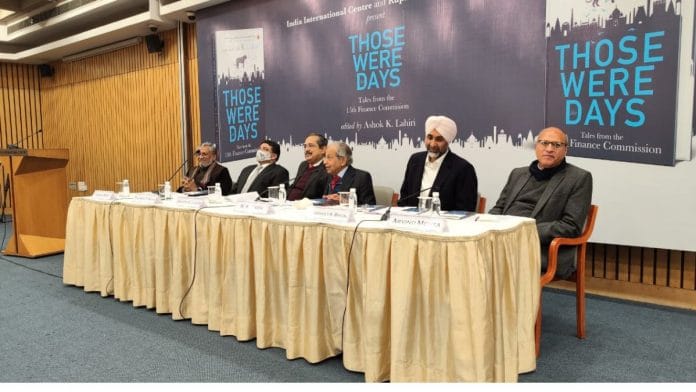The launch of a book about India’s 15th Finance Commission in New Delhi last week turned into a freewheeling conversation about Bharat Darshan. From platitudinous remarks about rich cultural diversity to Nagaland’s Christmas choir to the Golden Temple, the author and the panelists stayed as far as possible from macroeconomic policy.
India’s Finance Commission is responsible for providing recommendations to the central government on key economic issues like tax revenue devolution shares and revenue deficit grants to individual states over a period of five years.
But those unfamiliar with the inner workings of financial policy at the apex level would have learned little about this subject from the Finance Commission members who led Thursday’s launch of Rupa Publication’s book, Those Were The Days: Tales from the 15th Finance Commission by West Bengal MLA and Finance Commission member Ashok Kumar Lahiri, at the India International Centre in New Delhi. It was a classic Lutyens’ retirees’ soiree.
“Those Were The Days is not serious macroeconomics. We didn’t intend it to be so. It is really about the diversity of our experience and richness of [India’s] socioeconomic rubric that this book seeks to bring together,” said economist and Chairman of India’s 15th Finance Commission Nand Kishore Singh.
The panel discussion featured, besides Singh and Lahiri, commission secretary Arvind Mehta, Tamil Nadu finance minister Palanivel Thiagarajan, and former finance ministers Sushil Kumar Modi (Bihar) and Manpreet Singh Badal (Punjab).
Also read: Tame subsidies, hike fees for govt services — Centre’s tips to states to slash deficit
Kohima to Amritsar
True to his word from the outset, NK Singh moved away from substantive macroeconomic matters to extol the virtues of India’s religious and cultural diversity, which he and the rest of the 15th Finance Commission had observed closely since their appointment in November 2017. These, in Singh’s view, “informed the judgement” of the Commission in formulating its policy recommendations.
“This diversity, from the time we went to Kohima to pay respects at the cemetery or persuading the Nagaland CM to have the choir as Christmas was approaching. Or the ability of the commission, allowed by Manpreet to pay our respects at the Golden Temple, or the diversity we saw in Tamil Nadu and the need for upgrading heritage buildings…We were the first Finance Commission to go to Ladakh,” Singh said. He then detailed his experience requiring additional oxygen near Pangong Tso and even quoted Mark Twain.
The book’s editor Ashok Kumar Lahiri carried on the theme of reminiscing. Without getting into specifics, he praised how the 15th Commission — like its predecessors — had not been compromised. Reiterating Singh’s remarks, Lahiri noted that the book fills up a gap that “isn’t about state secrets.”
“This is about a bunch of people working together and going from state to state. It has been a grand education — I have been abroad and stayed abroad. I am not excited to go to London or Paris, but I get excited if someone asks me to go to Arrah [in Bihar],” Lahiri said.
As opposed to opening the floor for questions and answers from the audience, the panel instead gave the mic to other figures closely related to the 15th Finance Commission. These included the panelists’ wives and members of the Commission’s secretariat, who continued about how grateful they were for the opportunity to see different parts of India.
Also read: Finance ministry’s ‘assured funds’ is old story. Army can utilise land to generate revenue
Sushil Modi, PTR, Badal talk policy
With the Finance Commission eschewing specifics on finances in favour of waxing lyrical over their travels across India, the job of talking policy was left to the politicians Sushil Modi, Palanivel Thiagarajan and Manpreet Badal, who fielded NK Singh’s questions and focused on their home states.
Addressing the issue of the Commission’s role to “fortify trust” amid competing state interests, Modi singled out Bihar’s strong economic growth under Nitish Kumar as chief minister. He detailed the excitement he felt when seeing the Finance Commission’s reports over the years, while still providing critiques over state-specific grants and the numerous “conditionalities” in giving grants to states like Bihar.
Thiagarajan and Badal, on the other hand, responded to Singh’s queries on the future of Tamil Nadu’s economic development and Punjab’s “vicious cycle” of debt in between electoral cycles. While Thiagarajan revealed policy initiatives on increasing the “width of access” to women and children on education, food security and health, Badal expressed his disappointments with the preceding 13th and 14th Finance Commissions for not giving Punjab its due for its turbulent history.
(Edited by Ratan Priya)






